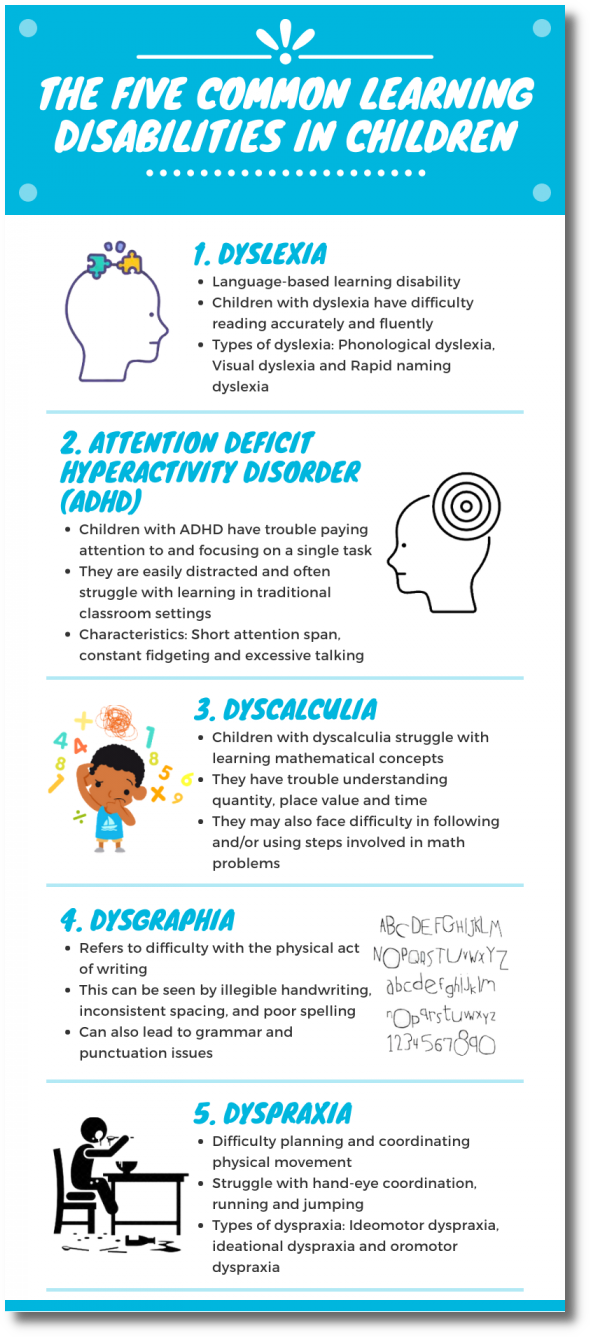Learning Disorders – Knowing Signs
Learning disorders can make it hard for a child to read, write or do simple math. Understand the signs and what you can do.
What is a learning disorder?
Many children with learning disorders struggle in school long before being diagnosed. This can affect a child’s self-esteem and motivation. It is important to be able to recognize the signs of a learning disorder so that you can get your child the help they need. Learning disorders generally affect people of average or above average intelligence. As a result, the disorder appears as a gap between expected skills, based on age and intelligence, and academic performance. Common learning disorders affect a child’s abilities in reading, written expression, math or nonverbal skills. If you suspect your child may have a learning disorder, speak to their teacher or a doctor about getting further testing done. With early intervention and proper support, children with learning disorders can overcome their challenges and succeed in school.
Reading
Many children have difficulty learning to read, but for some, this difficulty can persist into adulthood. Learning disorders in reading are usually based on difficulty perceiving a spoken word as a combination of distinct sounds. This can make it hard to understand how a letter or letters represent a sound and how letter combinations make a word. In addition, problems with working memory—the ability to hold and manipulate information in the moment—can also play a role in reading difficulties. Even when basic reading skills are mastered, children may have difficulty with more advanced skills such as reading at a typical pace, understanding what they read, recalling accurately what they read, making inferences based on their reading, or spelling. A learning disorder in reading is usually called dyslexia, but some specialists may use the term to describe only some information-processing problems that can cause difficulty reading. Although dyslexia can be a lifelong condition, with the right support and interventions, many people with dyslexia go on to lead successful lives.
Written expression
Written expression requires the ability to combine various skills in order to produce a well-written text. These skills include the ability to visually process information, generate motor movements and organize thoughts. A learning disorder in written expression can cause difficulties with one or more of these skills, which can manifest as slow and labor-intensive handwriting, handwriting that’s hard to read, difficulty putting thoughts into writing, written text that’s poorly organized or hard to understand, or trouble with spelling, grammar and punctuation. While some individuals with a learning disorder in written expression may be able to overcome their difficulties with extra effort and practice, others may require specialized intervention in order to improve their writing skills.
Math
A math learning disorder can cause problems with a variety of skills, from understanding how numbers work together to memorizing basic calculations. As a result, individuals with a math learning disorder may have difficulty solving even simple math problems. In addition, Math learning disorders can also make it difficult to understand word problems or to keep track of information while solving a problem. However, with proper diagnosis and treatment, many individuals with math learning disorders are able to overcome their difficulties and succeed in school and in life.
What causes learning disorders?
Factors that might influence the development of learning disorders include:
- Family history and genetics. A family history of learning disorders increases the risk of a child developing a disorder.
- Prenatal and neonatal risks. Poor growth in the uterus (severe intrauterine growth restriction), exposure to alcohol or drugs before being born, premature birth, and very low birth weight have been linked with learning disorders.
- Psychological trauma. Psychological trauma or abuse in early childhood may affect brain development and increase the risk of learning disorders.
- Physical trauma. Head injuries or nervous system infections might play a role in the development of learning disorders.
- Environmental exposure. Exposure to high levels of toxins, such as lead, has been linked to an increased risk of learning disorders.
What are the signs of learning disorders?
Your child might have a learning disorder if they:
- Doesn’t master skills in reading, spelling, writing, or math at or near expected age and grade levels
- She has difficulty understanding and following instructions
- Has trouble remembering what someone just told them
- Lacks coordination in walking, sports, or skills such as holding a pencil
- Quickly loses or misplaces homework, schoolbooks, or other items
- She has difficulty understanding the concept of time
- Resists doing homework or activities that involve reading, writing, or math, or consistently can’t complete homework assignments without significant help.
- Acts out or shows defiance, hostility, or excessive emotional reactions at school or while doing academic activities, such as homework or reading
Treatment options
If your child has a learning disorder, your child’s doctor or school might recommend the following:
- Extra help. A reading specialist, math tutor, or other trained professional can teach your child techniques to improve their academic, organizational, and study skills.
- Individualized education program (IEP). Public schools in the United States are mandated to provide an individualized education program for students who meet specific criteria for a learning disorder. The IEP sets learning goals and determines strategies and services to support the child’s learning in school.
- Classroom accommodations might include more time to complete assignments or tests, being seated near the teacher to promote attention, using computer applications that support writing, including fewer math problems in terms, or providing audiobooks to supplement reading.
- Some children benefit from therapy. Occupational therapy might improve the motor skills of a child with writing problems. A speech-language therapist can help address language skills.
- Your child’s doctor might recommend medication to manage depression or severe anxiety. Medications for attention deficit/hyperactivity disorder may improve a child’s ability to concentrate in school.
- Complementary and alternative medicine. Further research is needed to determine the effectiveness of alternative treatments, such as dietary changes, the use of vitamins, eye exercises, neurofeedback, and technological devices.
Seeking Help
Early intervention is essential when it comes to learning disorders. If a child is having difficulty in elementary school, it will be much harder for them to catch up in high school. Additionally, children with learning disorders often experience performance anxiety, depression, low self-esteem, chronic fatigue, or loss of motivation. As a result, it’s important to seek help as soon as possible. A child’s teacher, parents or guardian, doctor, or other professionals can request an evaluation if there are concerns about learning problems. Your child will likely first have tests to rule out vision or hearing problems or other medical conditions. By getting help early on, you can give your child the best chance for success! Please call to Schedule your appointment today at 816.819.5166 or schedule your appointment online.












